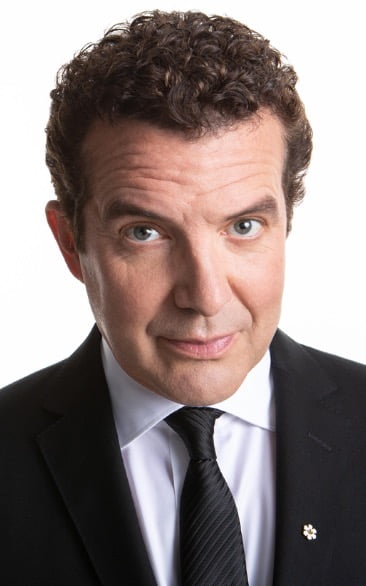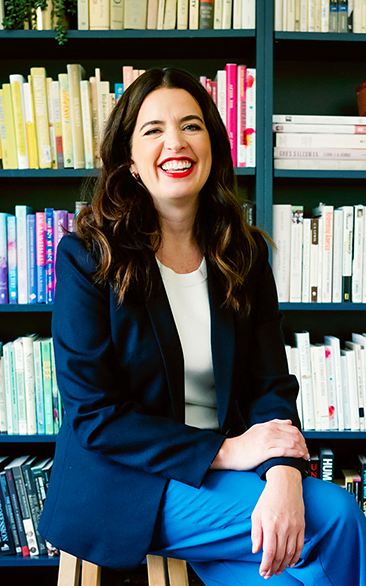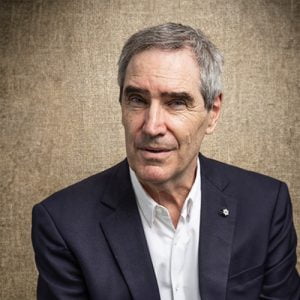Kate Bowler: I’m Kate Bowler, and this is Everything Happens. There’s a feeling we can get when life has been too small for too long. It’s not depression, exactly or even hopelessness or anxiety or fear, but a certain form of exhaustedness. My wonderful friend Adam Grant and former podcast guest, you will love that episode if you haven’t heard it, but Adam wrote a lovely piece for The New York Times about this feeling, and he called it by a wonderfully precise name: languishing. Languishing, he wrote, is a sense of stagnation and emptiness, a feeling like you’re looking at your life through a foggy windshield. So if mental health runs on a spectrum from depression on one side to flourishing on the other, languishing is that dull blah that we sometimes overlook because it’s not the worst… It’s just not joy. And it can be hard to dream new dreams or find that ease or that momentum. Languishing is one of the great challenges of this moment as we try to live with the full spectrum of possibilities and emotions and dreams as much as we can even now. So do I have a treat for you? I’ve had evenings and weekends open lately, so I spent it building a time machine and went back to 1969 to ensure today’s guest was born on the island province of Newfoundland. Then I created a reasonable set of obstacles for him to navigate and watched him become one of the funniest people to ever call Canada home. He is a master of reinvention and the consummate dreamer you will meet today. And of course, I’m talking about Rick Mercer, Canadian comedian, television personality, political satirist. He is best known and beloved for his work on the CBC television comedy shows This Hour Has 22 Minutes and Made in Canada and the Rick Mercer Report. In 2014, he became especially fancy as he received the Order of Canada because he is like, if you combined Steve Martin and Peter Jennings and your Aunt Linda, yes, the one with all the opinions rolled, into one human man. And his bestselling memoir, Talking to Canadians, made me laugh out loud and remember that every good dream begins with conscripting friends into ridiculous wigs. Rick Mercer, how is it that we are speaking? One of us has either done something terribly right or terribly wrong to bring me to this moment.
Rick Mercer : I am so very pleased to be here, but we are speaking because my publicist told me to speak with you and he said, You’re going to love her and she’s a huge deal. She’s a big wheel.
Kate Bowler: She’s medium sad is what he probably said. And you’re like alright! I bet I could handle that.
Rick Mercer: I know you’re a big wheel. That’s about it.
Kate Bowler: You are the most fun person to explain because to Canadians, you’re like, if you combine Walter Cronkite and then the entire cast of Saturday Night Live. You’re this incredibly trusted commentator who might also punch us in the esophagus comedically, of course.
Rick Mercer: So I would never punch anyone in the esophagus
Kate Bowler: No, never convicted. No. So you grew up in Newfoundland, which for those who do not know, who cannot know, would you mind explaining, perhaps, maybe the independent spirit of Newfoundland?
Rick Mercer: OK, well, I’m from Newfoundland and Labrador, and it’s interesting you say it’s an independent spirit because Newfoundland was independent until 1949. So while I was born a Canadian and raised a Canadian and was used to Canadian money and the Maple Leaf and all that, my father’s generation, they weren’t born Canadians. They voted either for or against joining Canada, and it was tight. Forty nine percent said no, no the hell with them. We’re going on our own. So it’s natural that Newfoundlanders have always felt like outsiders. Also, the vast majority of the population of Newfoundland and Labrador live on the island of Newfoundland, so we’re also one step removed and traditionally people made fun of us. And so we were kind of laughed at so that that made us put a chip on our shoulder, I guess. And we talk funny. People always made fun of our accents, and there are some spectacularly ridiculous accents, I should admit. So, yeah, we were outsiders. We’re outsiders with an independent streak. And also we’re proud of the fact that we live in this ridiculous place that it makes no sense to live there. We were also always we were also always economically depressed with our own confusing time zone.
Kate Bowler: Yes, in my in my last surgery, I was delighted to realize that the nurse in this American hospital was this big dude from Newfoundland, and when he was, it looked like he was going to snap the pen as he was writing on clipboard, he was like, what surgery are you in here for? I was like, I don’t know whatever you clawed me with your, with your giant bear like hands. And he looked at me like, wait. And for some reason it’s like, Are you from Canada? Yes, he’s like, Would you like to meet every Canadian in this hospital? And then with my little gurney, he took me on a tour and I met all kinds of Newfoundlanders that day.
Rick Mercer: Oh, good!
Kate Bowler : You had this moment. Early on where you really learned how to kind of harness that independent, dreamy kind of spirit, which is to say you learn to try something that you had absolutely no idea how to do and were likely to fail doing. And you had this wonderful drama teacher named Lois, who did not act like a typical drama teacher and seemed to know that you were a really terrible stage manager and should be doing something else.
Rick Mercer: Well, I was intrigued by drama. Ever since I was a kid and I was in grade three and I saw a school play and that school play but actors came to the school and performed a play, and it was life-changing for me because it was the first time that I was truly blown away. I was miscast as a kid. I didn’t, and I only realized this when I started looking back to write this memoir. Like, I was happy enough and I certainly wasn’t depressed or anything, but I wasn’t into stuff the way the other kids were, like dinosaurs or dinky toys or whatever the hell kids, you know, kids go through phases where they’re obsessed with things. I just, yeah, I was just not that kid. And my mind was blown when these actors showed up and did a play. I just thought, Oh my God, it’s the most amazing thing in the world. I didn’t think I could do that, but I just didn’t know that people did that for a living. How amazing was it? And so it was always in the back of my mind. Finally, in grade 10, or went to a high school, and I knew there was a drama club and I was intrigued to join the drama club. Not so much because I wanted to do drama, but I thought it was probably a de facto gay straight alliance, which it basically was. But I did enjoy it because I was in the closet, and the day they made the announcement, the drama club was meeting a bunch of guys in the in the classroom, ooh the drama clubs meeting all the fags and freaks are going to the drama club. And I died inside and I thought, Oh, if I go there, I’ll be branded as a homo, so I won’t go there. The next, by the time next year rolled around, I didn’t give a shit about anything like that, so I joined the drama club. And we did a play, it was a commedia dell arte play, and I hated the play and I thought the lead was ridiculous and I didn’t really particularly like the people in the drama club. They were all older and they were a bit of a clique. I became the stage manager and I was terrible at that, and all I did was sit next to Lois, who was the director and talk at her the entire time, and I found her endlessly fascinating, but I found the play terrible. So when the play was over, I said to Lois, Well, that’s it, I’m quitting the drama club. And Lois said, Oh no, no, you can’t if you quit the drama club. That will be one of the biggest mistakes of your life. Now, Lois is a bit eccentric, but I thought this is a little dramatic and over the top, it’s talking about quitting an extracurricular activity. I’ve done that my entire life. And I said, Why would it be such a big mistake? And she said, Well, the next play is really important because it’s a one act play and it’s going to the provincial drama festival. And I said, What’s the play? And she said, I don’t know because you haven’t written it yet. And looking back, if there’s moments that really change your life, that was it for me in a nutshell, because I thought, Yeah, OK, I’ll write a play. And then, yeah, I learned it was going to be a collective, which means it was going to be a creation of a group of people and Lois put this group of people together at that, by today’s standards, I think in school, half of them would be classified as at risk youth, and we were this motley gang of weirdos and not joiners and all sorts of stuff going on. And we wrote and created this play that did win at the provincial drama festival. But more importantly, it changed my life. I met my comedy partners. I suddenly knew what I was going to do. We would just sit around and say, We’re going to be actors and writers at Newfoundland, and nothing else mattered after that, and we were singularly focused on having a creative life. And I kept going ever since.
Kate Bowler: It’s always one of the weirdest, I think and loveliest things about artistic expression or just the sort of reaching for things and dreaminess is that our dreams really are so specific to our contexts. Like they, they tell us about who we are and then who we might be. The amount of time I spent as a young adult watching television shows about teenagers in California, and they’re very important and difficult problems.
Rick Mercer: Sure, of course.
Kate Bowler: It was so hard for them. It was sunshine all the time for my Winnipeg six month winter, and it was a little helpful when this one character seemed very upset about a standardized test, which I realized like I might actually need to take at some point. So I did take the information from the show Saved By the Bell and approach my high school guidance counselor in Winnipeg. I was like, Look, I I think there’s a test I’m supposed to take if I want to go to one of these schools, and that did, that did serve me well.
Rick Mercer: So it taught you well. Oh, that’s great.
Kate Bowler: But your first big splash was a hilariously specifically Newfoundland dream, and you knew that audiences would love to hear more about an incredibly specific set of political questions and then and then a national crisis surrounding the Meech Lake Accord. Now, for those of us who may not have been just just mired in the then the political hotbed of the Meech Lake Accord? Why, why did you do it? And just follow up, why is that so funny?
Rick Mercer: Well, it was the Meech Lake Accord was a constitutional amendment to Canada, and in order to amend the Constitution, you needed all provinces to sign off. And the whole point was to get Quebec to sign on because Quebec had never when when the Constitution was repatriated from England and came to Canada, everyone signed on the dotted line, except for Quebec. So the current prime minister at the time, it would be a huge coup to bring Quebec truly into the federation and in doing that, they classified Quebec as a distinct society, and some people thought that that there was a problem with that because the provinces are all equal and this distinct society label would in fact mean that Quebec was a little bit more equal than everyone else. Now, I didn’t really have a problem with it, and I wasn’t a scholar of it and all the provinces had signed on. But then some provinces changed governments, and suddenly there were liberal governments and some of the provinces. And Pierre Trudeau, former Prime Minister Pierre Trudeau came out of the woodwork, and he said that this is a terrible thing for Canada, and some provinces agreed. One of them was Newfoundland. And for a while, it looked like Newfoundland might be the one holdout. And this guy, Charles Lynch, who was a very famous Canadian journalist, he was a war correspondent and he was head of the sort of news service, he was a major columnist and author in his 70s. He wrote this column and said, Well, if Newfoundland is going to stop Quebec from truly becoming a partner in Canada, the solution is obvious. We throw Newfoundland out. They’re a basket case, we don’t need them. And then he said, all sorts of terrible things. And with his tongue in cheek, quite frankly. But as a young man, as an angry young man, I didn’t see the tongue in cheek and I went ballistic and I subtitled my show Charles Lynch Must Die. So it’s called Show Me the Button. I’ll push it, or Charles Lynch Must Die. And we opened in this little tiny theater in Ottawa and at the National Art Center, which the National Arts Center has a big, beautiful opera house. But this was a little theater they ran across town in an old garage. And Charles Lynch heard about this. And of course, he started writing columns about how he was the new Solomon Rushdie of Newfoundland and that a fatwah had been put on his head by an angry young man by the name of Rick Mercer. And he said, Well, I’m going to be there front row and center. I won’t be coward. You know, I won’t be, I’ll be there watching. Of course, I was like, Oh my God, what have I done? And then we ended up in a room together, and he was quite nice to me. And he said, I won’t come to the show if you’re too nervous. And I said, Well, nothing can make me more nervous than I am. So he came to the show. He too stood up that night when I got a standing ovation. Then he started writing columns about the show again with his tongue in cheek, but calling me, you know, about how terrible it was the show is happening, but also saying it was hysterically funny and referring to me as the boy genius. And he sold all the tickets for me. And of course, all the journalists in Ottawa couldn’t believe I wrote a show called Charles Lynch Must Die because he was one of the most respected elder statesmen in that business. They were like, Who in God’s name, is this saucy 19, 20 year old from Newfoundland to say, Charles Lynch must die. So I became a bit of a cause celeb and on farm to robla and and it and it exploded into a national tour. And that changed everything.
Kate Bowler: I just think it’s got such a wonderful like nd then I became very famous with a 70 minute one man play about the controversy surrounding the Meech Lake Accord.
Rick Mercer : That for most Canadians, was incredibly boring. The idea that you would write a play about a constitutional amendment. It was ridiculous. But then I lucked in. You know, I talk about luck being so important and luck and go both ways. I lucked in and Charles Lynch promoted the show all the way. Everywhere we went we would get on the radio and yell at each other and people just thought, Oh, all right, let’s go down and see what that’s all about.
Kate Bowler: They’re very sweet, very tender, funny, last joke from him.
Rick Mercer: Oh yeah. Well, he he became sick with cancer and he had cancer surgery, and I looked I asked around and they said, Well, his spirits are high, but he’s very, very ill. And he again wrote a column about how he didn’t want to die too soon because as long as he’s alive, that freaking Mercer is making money. And so we were heading into Vancouver.
Kate Bowler : That’s so great.
Rick Mercer : We headed into Vancouver, and I called him up and I said, you know, I was sorry to hear how you’re doing. I said, I said, by the way, we’ve taken Charles Lynch Must Die off off the poster in Vancouver. It’s just called Show Me the Button I’ll Push It. And he said, Why the hell would you do that? And I said, Well, no offense, you might die. And if you do, you’ll be on the front page of every newspaper in Canada because you’re so famous. And I’ll be in Vancouver with the show that says Charles Lynch Must Die, that’s terrible taste, you know? And he said, Well, how long is your run in Vancouver? And I said six weeks and he said, OK, I won’t die for the next six weeks, I promise. But don’t you take my name off that poster? I said, OK, I won’t. And he ended up living for many years. And when he did eventually pass away, I was on television doing This Hour Has 22 Minutes. I was probably two or three years in and he died. And about a week later, an envelope arrived in the mail and I opened it and it was the bulletin from his funeral and there was a sticky note attached to it. And it was in his handwriting, it said. For your files, regards Charles Lynch.
Kate Bowler: That is so funny. What a wonderful, what a wonderful, sardonic person.
Rick Mercer : He got the last line.
Kate Bowler: The Everything Happens community is one that talks a lot about luck, like, good luck, bad luck. I know you’re so generous about your success and saying that, you know, people who are successful people are also very lucky people. But I’m so struck about your ability to reinvent in the midst of failure. I mean, you were, I love the story where the head writer of a three hour show without intermissions and you said it was just so it was so powerful you just could not cut a single word, a single word.
Rick Mercer: No. And not only that, it had the most impenetrable title. We Have No Pity for the Pseudo Downtrodden. I mean, imagine how much angst was on that stage, and it was a collective. But I was the head writer, de facto head writer, and Lois was directing it, and it was a big budget production for the theater company that we sold it to and Lois begged me, You had to cut something you have to. And I looked at it and it was like,.
Kate Bowler: It’s perfect.
Rick Mercer: I can’t, because it’s just all so perfect.
Kate Bowler: Each word a miracle.
Rick Mercer: Each single word a miracle.
Kate Bowler: Layer after layer.
Rick Mercer: Yes. And to this day, I was like 18, 19 when we did that show to this day. I know people who, if they’re talking up, my name comes up. They’ll say, Well, you never had to sit through We Have No Pity the show he did, My God, I never, it was awful. It’s like years later, 32 years later, it still kind of like, Yeah, that’s certainly taught me to be brief.
Kate Bowler: Yeah.
Rick Mercer: And I try to show because everyone in the show was kind of popular from our comedy troupe. Yeah, we sold lots of tickets to this show. And I think we sold out before we even opened. But every night I would say it was like a it was like a fire alarm went off after about an hour. The actors couldn’t hear, but the audience could because people were just like, Oh, at once, one person did it and people were like, Oh, it’s OK to storm out.
Kate Bowler: Yeah, you held a siege, just a slow war of attrition.
Rick Mercer: But you learn from that stuff, you learn those failures. If you don’t learn from those failures, you’re a fool. And I learned so much from so, so many failures early on. And luckily, when it counted, when I did that one man show or when we opened This Hour Has 22 Minutes, I locked in and knocked it out of the park. But if it wasn’t for those other failures, I don’t know if that would have been possible.
Kate Bowler: Do you feel like when you have a moment of failure, I’m just thinking in my mind of times in which an editor has given back a book that I thought was pretty good. That’s just like full chapters were gone, chapters were missing, chapters were no longer part of my mind, new an upcoming book. But the letting yourself, I don’t know, just like like a plant, like something gets pruned off so that something else can grow. Do you feel like that or do you need a minute sometimes to nurse those wounds?
Rick Mercer: Oh, sometimes they, well it always hurts. And I can’t tell you how many times, especially when I was writing long form and and doing the sitcom that I did, I would give this script to Gerald, who was the showrunner, also my partner, and we lived together, and he would come back and the first 11 pages would be crossed out, and they would say start it here. I’d be like, I let- that means there’s only seven pages of the script. That means I have to write 11 more at the back end. he’s like, yeah those first 11 pages no good. And it’s devastating. But I decided a long time ago that I would trust his opinion. So when he does that and with the Mercer report, when he said that this rant is no good. I just trusted myself for making that decision so many years earlier that I would always trust his opinion. And I never pulled rank like, Wow, who are you to tell me that? You know, I know what’s good and I’m going to do it.
Kate Bowler: Yeah, yeah. Being criticized by people who love you is a certain kind of trust fall, isn’t it?
Rick Mercer: Well, I had to trust the critic and I kind of despise critics, like so many people in show business do. But that’s not to say that I’m not open to criticism. But I will take Gerald’s criticism because I trust him. There’s many, many people that I will take the criticism from. But critics, by and large, I don’t have a lot of time for them. Some of them are good, but I don’t understand them. And I think too often they make sport of criticizing people. Yeah. But it’s their sport. I just don’t want to play it.
Kate Bowler: No, I like the people who try. I just like the vulnerability of that. I love watching people try. I mean, right?
Rick Mercer: What I hate is when people say, you know what you should do? Just drives me crazy. You’ve got a podcast, you know what you should do? You should do… It’s like no. Why don’t you do that? Well, you know, when you see a lot of podcasts, you know what you should do, you should do a top 10 list every time and you’re like, No, because that’s not what I do. Yeah, yeah. You know, I have a friend who has as a cookie shop, every second person goes, You know what you should do?
Kate Bowler: No, you know what you should do? Yeah. There’s a version of that for suffering people that goes something like, Well, have you tried…? And it’s always someone’s recently seen a documentary. A lot of eye contact.
Rick Mercer: Oh, yeah, yeah, yeah.
Kate Bowler: And or a lot of I’ve done some research. The research is just a lot of what they mean is like Googling, and there’s just suddenly just a whole, a whole world of medical possibilities that should’ve opened itself up to me.
Rick Mercer: And there are certain holistic people, and I’m not going to upset the holistic community, but I worked with one and who was endlessly fascinated by that stuff. And she would meet someone who would say, I have, you know, cystic fibrosis. And she would like, Have you tried oregano? Have you tried oregano? You know, you’re like the woman has cystic fibrosis. She’s had it since she was a child. She’s essentially terminal. There’s no cure. And it goes on. And yeah, yeah, have you tried oregano. You should call the Cystic Fibrosis Association with that information.
Kate Bowler: Yeah.
Rick Mercer: They opened a weed store in St. John’s, Newfoundland, and you know, they did what it does word- what do you call the jumbles?
Kate Bowler: Like the word clouds?
Rick Mercer: Word clouds. And it says, and they had the two large words were cannabis cures. And then it was all the different things. And it was like aids.
Kate Bowler: Like, Wow these are big, bold.
Rick Mercer : And Cancer. These are, God, someone should write an article about that. Yeah, smoke a joint. Yeah. And I understand people wanting to believe that. But yeah, it’s.
Kate Bowler: You had a just a long stretch of being, I mean, not not a like a not by your admission, like a terribly devoted student, though, you gave a strong pitch for staying in school and the importance of education. I really I really liked that. But in high school, you joined the circus. I mean, an actual circus with Newfoundland’s only professional clown. Oh, I’d love for you to tell me about him. And also, I just thought he was a perfect example of the kind of person who helps us dream, ridiculous things.
Rick Mercer: Sure, sure. Well, his name is, is Beni Maloney, he’s still with us. And he has, he was the founder of Wonderbolt Circus, which is still a significant company in Newfoundland Labrador. And now, in fact, run by his daughter, who’s an aerial artist fantastic and they do the circus festivals and all that. But back in those days, Beni would tour the island in a station wagon and do one man clown shows in for schools, and we’re all hanging around and stuff. And he was going on tour and I basically said, Can I come with you? And he said, Well, I need someone to drive the van and help out backstage and say, Take me, take me. And he said, OK. And basically, my school career was I was beyond help. At that point, I was only going through the motions of going to school for the social aspect, and there was no way I was going to be able to graduate unless I went back for another whole year. That was not going to happen. I was going to go off and be famous in a comedy troupe. I had no time for that. And so I don’t know what my parents were thinking, and I don’t, it’s so funny looking back. I don’t know what Benny was thinking because I wasn’t even old enough to drive the station wagon. You have to be 25 to drive somebody else’s vehicle. I guess I was 17 because I had a driver’s license, but and we we would tour all over the island doing clown shows, and it was like living the dream baby.
Kate Bowler: You were, as I recall, like a like a roller skating robot?
Rick Mercer: I was Bucky the robot. And I had to roller skate, which I couldn’t really do. And while I was doing costume changes and I had a big metal head that was made out and made by a Tin Smith in St. John’s, but it was made for Benny’s head. Benny didn’t like it because he couldn’t see the jungle as the robot, so we just invented Bucky, the roller skating robot, which was me. But I have a ginormous head like my head is actually
Kate Bowler : You’re leaning toward me for perspective, I love it.
Rick Mercer: No seriously, way bigger than most people on Earth, and Benny has a little tiny head. So when it was in on my head, I like the eyeballs were up here. So literally just looking at light on the ceiling. And that’s how I would move around and I would often run over children. And once I went right off the stage like I was roller skating and suddenly I was floating and I was like, Oh my God. And kept going and the kids went wild. It was great. I didn’t end up in a wheelchair. Yeah, I was the- and it was a great, great time.
Kate Bowler: Beni is so hardworking and compassionate and wanted everybody to see something live in their life.
Rick Mercer: Beni was a missionary in that sense, because we would it would be a dollar child. So you go with $300 in a school with three hundred kids. But then and then you might do two of those in a day. That’s good money. But then we would drive for hours and hours and hours and then get on a coastal boat and go to a community where there was 30 kids. Yeah. And then we go to a community where there was 75 kids and this was costing him money. He was, and he wasn’t sponsored by the government or anything. It wasn’t like he sold the tour to the schools. He just did it out of the goodness of his heart because he believed in live theater. And I certainly believed in that because I could remember when I was in grade three and those actors came and what an influence it had on me. So I felt like we were doing God’s work, too. Yeah. Or the circuses work, you know?
Kate Bowler: Yes.
Rick Mercer: Oh, I can’t tell you how many people there are Newfoundland, who is probably the first time or the only time they ever saw a live show was would have been one of Beni’s productions, yeah.
Kate Bowler: For the decade and a half that you did the Rick Mercer report, which is just always been one of my very favorite shows. You absolutely kept the same spirit of Let’s go everywhere, let’s meet everyone, let’s decide that everybody’s local thing is hilarious and fantastic. You absolutely lived my dream. You celebrated local culture wherever you went, and I will absolutely put in the show, notes the basically atlas of Canada you have and all the hilarious like you went to the you did a bunch near my hometown. You, in fact, were only a couple of blocks away from my parents house.
Rick Mercer: When, what? What was I doing?
Kate Bowler: You were Mr. Popsicle. You went to test the idea that Winnipeggers for the hardest people on Earth by being dunked in ice water. It’s so funny
Rick Mercer : And people always thought, people always say, Oh my God, you get the best job in the world. And I believed I had the best job, but then they would explain to me why they thought I had the best job in the world. They say, like, you get to do everything on your bucket list. I was like, I that shit, you were talking. I was put in a pre-hypothermic state. They literally sunk me in an ice bath and I had a thermometer stuck up my nose, down my throat, behind my heart just to make sure that I was still alive and they wanted to put one up the other end, but of course, I said no, because we can’t show that on camera so thank God so I won’t do that. But yeah, there’s lots of things that weren’t on the bucket list. I was tasered and it never went on television, but I was literally tasered. Like, talk about a mental illness. Like actors will do anything for a laugh. And I never thought I was that guy. I was like, I’m not one of those guys. And then suddenly I was standing there waiting for a cop to shoot me in the back with a taser with cameras pointed at my face.
Kate Bowler: There are some moments of genuine fear on your face right before some exciting moments you’re having where they’re like, you’re on a dog sledding race and the guy’s like, all of this picks up real fast. You’re just about to launch into space pulled by dogs, basically. Or, yeah, I mean, they’re not all going to be you visiting the Morton Corn and Apple Festival and just holding up corn. I mean, you did some really-.
Rick Mercer: And that was important too! We’re celebrating corn this week.
Kate Bowler: You did. You did celebrate corn. You kind of celebrated everyone. I I have this overwhelming love of visiting like world’s largest world’s smallest statues.
Rick Mercer: Oh yeah, yeah, yeah.
Kate Bowler: So, you know, for instance, in a small town in Manitoba, there is in fact the world’s largest replica of a fire hydrant and the world’s second largest because after someone thought they built the largest, someone was a real dink about it and build something like three feet, three feet higher. And I just find that the there’s something that it does to us where we get immersed in other people’s dreams and contexts that in a way I don’t know, I find it cures me of, I don’t know, narcissism it cures me of thinking my own problems are.
Rick Mercer: And so sometimes people would try to sell us like, come. You know, there’s a group of us come celebrate us like you celebrate everyone else and we’ll be like, Well, what do you do? And they’re like we paint miniature figurines, little tiny figurines. And we all get together and we’re like little tiny figurines. And you just go, you feel terrible because you couldn’t figure out a way to put that on television and make that. Yeah. Like jam packed with action, you know, because you could you needed a special camera to see the figurines. But I loved it. You know, you meet some people and they would get up in North Bay, Ontario, at four o’clock in the morning and drive two hours to a great rock, a great waterfall that was frozen. And as the Sun would come up and then just driven two hours down a road and there in 40, 30 below, they then put on all this really uncomfortable gear and climb up it and then come down it and then drive home in time to go to work. Yeah. And but I always find it fascinating that they found each other, that this is what brings them joy, that in their mind that’s what they are. Yeah. They’re not an accountant. They’re an ice wall climber and and an accountant because ice wall climbing doesn’t pay.
Kate Bowler: Bi-vocational.
Rick Mercer: But it, you know, that’s their church. And that’s great.
Kate Bowler: It does shake us out of. I think that was one of the things that felt like it’s been lost in the construction of the pandemic is the feeling that we can be multiple things and that and then by being multiple things, we can sort of, yeah, like stop letting our lives shrink quite so much. Right? Being from Winnipeg, it’s it’s not like a natural place of self-esteem, I would say. Having lived in the states for a long time, people are confused about where Manitoba is, or positive it’s near Texas or.
Rick Mercer: And you, you tell them it’s exactly in the middle of Canada. That’s where Winnipeg is. Yes. But they don’t know what Canada looks like, so that doesn’t help them.
Kate Bowler: It doesn’t. But having a pride in being from a place that is wonderfully humble has been something I’ve kind of always carried with me. It’s not possible to have a fancy car because it’s buried in snow and sand and salt anyway.
Rick Mercer: Yeah, it’s gonna self-destruct.
Kate Bowler: It goes from winter to flooding to hanging worm season, which I didn’t know was universe- not universal to mosquitoes and then back to the the sun decline. But and then in the very middle of the city, there is an enormous pile of trash and we sled on it and we feel joy. Of course,
Rick Mercer: Of course, of course you sled on it.
Kate Bowler: And in the spring when it thaws and you can really smell it. Then we talk about real estate based on how far or away from the downwind dump we are. And the nicer neighborhoods are a little more down downwind.
Rick Mercer: You have got that big sky, which I never understood. I always when people from the prairies were talking about big sky I’d be thinking everyone’s skies big. What are you talking about? Until one day when we pulled up and I didn’t see it from the from the highway and the sun was setting, we had to pull over on the side of the highway to take a leak. And I walked out and I looked up and I was like, Oh my God, wait a minute, is this is of it? Yes. Yes, I am just a speck in the universe. Yeah, you got that big sky. That’s pretty, that’s pretty spectacular.
Kate Bowler: Looking back on so many years interviewing. I mean, every kind of person from politicians who you are making hilarious jokes to and around, to the people of Thunder Bay, what do you think, what qualities do you think make us feel most connected? Is it when you’re showing- I’m just thinking of episodes where you show people at their most human and basic like they, they want connection. They need community. I think.
Rick Mercer: I think, gosh, you’re really a you’re a tough interviewer, aren’t you? Usually people say, Where do you get your ideas? Why didn’t you ask me that question? I think I like showing people at their proudest in a way, because they’re either proud of their hometown or they’re proud of the fact that they are a wheat farmer, they’re proud of the fact that they climb that rock wall and and, you know, when you’re watching someone who’s proud of themselves, you can’t help but feel happy for them. It’s it’s fun. It’s fun to see, even if you’re going My God, what kind of mad person would do that? Who would climb up a rock ice wall. And by the way, things haven’t changed. I never found that thing, like when I said it was a kid, I was never. I like doing things, but I wasn’t fascinated with it. I never found anything that I picked up. Yeah. Like, I never picked up the ice climbing. I never picked up demolition derby. I never picked up joining the army. I never picked up oyster fishing. I did all the recreational stuff. Yeah, skipping. Didn’t pick any of it up.
Kate Bowler: Totally. Oh, I but I think I mean, I’ve thought a lot about bucket lists and what do we do with our time? And I have to say I don’t have hobbies, I have friends, and it sounds like you’re so good at connecting with people. Maybe, maybe your thing is just connection, your ability to be interested in everyone and everything. And to keep dreaming and reinventing is just an absolute delight to watch. And thank you so much for walking me through all that dreaminess.
Rick Mercer: That is so kind of you to say, and I’m really interested in you, now am I.
Kate Bowler : Rick Mercer, everybody. Oh my gosh. That conversation made me so happy because no one celebrates the absurd and oddballs and the comedian better than Rick Mercer. May it remind all of us to better celebrate ourselves and one another. And because we believe in blessing the crap out of each other here at the Everything Happens project instead of carpe diem today, let’s crape diem. Let’s bless the garbage. Embrace little realistic enthusiasm to face the day. All right. Here’s a blessing for what makes us, us. Blessed are you the strange duck. You with the very intense hobbies, or the collection of stamps, or mugs, or first edition books. You with the hometown that makes you proud. Or the television shows no one else is interested in, and yes, you’re explaining it right now. Do you have 40 minutes? Season four is incredible. Not everyone will understand, but these are the things that bring you delight and joy and remind you of who you are. Blessed are we when we learn to be delighted when we practice our capacity for joy. May we be shocked that in a world of heartbreak that we can be shocked at all. Blessed is our curiosity and our aliveness when we want to learn anything at all. Or when we want to find comfort in the friends we have. The places we love, no matter how quirky or random or obscure. Oh, and blessed are we when we are absolutely basic, when we have a Starbucks order that is actually everyone else’s favorite and we tell everyone about an amazing new dish called bread, and it comes at the start of every restaurant meal. Whether you stand out or blend in with the wallpaper, love only that obscure novel or post your wordle score daily. May we never be above delight itself. We discover, we marvel, we play, and in all our intricacies, in all your particularities, my dear, you are a marvel.
Kate Bowler: Don’t miss an episode. Be sure to subscribe to Everything Happens wherever you listen to podcasts. Oh, and leave a review while you’re there. I would love to hear from you. We always read those reviews and love, love, love hearing your stories. They are really special to us. So come find me online at Kate C Bowler or at KateBowler.com. And if you want, join us for Lent. Beginning on Wednesday, March 2nd, we’re inviting you to read along with us as we have a Good Enough Lent. Learn more and download a free discussion guide at KateBowler.com/lent. That’s KateBowler.com/lent. Here’s the part where I get to thank everyone who makes our work at the Everything Happens initiative possible. Lilly Endowment. The Duke Endowment. Duke University. Duke Divinity School. And Faith in Leadership an online learning resource. Thank you so much for your generous support and my team. Jessica Richie, Harriet Putman, Gwen HEgginbotham, Keith Weston, JJ Dickinson, Karen and Gerry Bowler, my parents, and Jeb and Sammi. Your gifts make this work shine. And I’m Kate Bowler and this is Everything Happens.
















Leave a Reply